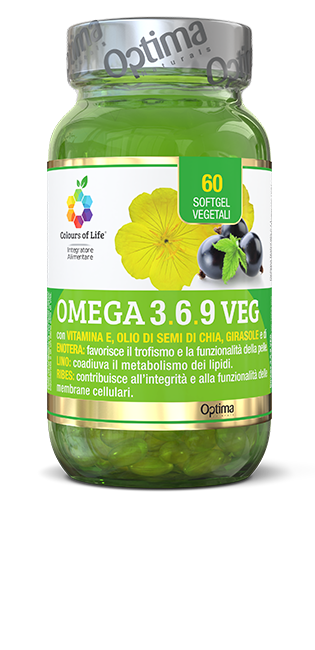BLOG
Omega 3-6-9 fatty acids: indispensable allies for health

Omega 3,6,9 fatty acids: what they are used for
Omega fatty acids are polyunsaturated fatty acids that perform energy and structural functions in our body and also have a very important metabolic and regulatory role: they are indispensable for the formation of cell membranes, healthy skin, the synthesis of haemoglobin and molecules that regulate the production of hormones, vasoconstriction, immune, coagulative and inflammatory processes. Among the many properties attributed to them are also antioxidant properties and, in general, those related to the good functioning of the cardiovascular system.
The omega fatty acids include Omega 3, 6 and 9.
Because they perform the important functions described, these nutrients must be present in the human body at adequate levels and in a constant ratio to each other.
Omega-3 and Omega-6 are essential fatty acids, indispensable for the proper functioning of the body and cannot be synthesised but are only taken in through food.
Omega-9 are not considered essential fatty acids; the human body can synthesise them from other unsaturated fatty acids.
Let's see them in more detail.
Omega 3
The main fatty acids of the Omega-3 group are:
- alpha-linolenic acid (ALA),
- eicosapentaenoic acid (EPA),
- docosahexaenoic acid (DHA).
The progenitor of the Omega-3 family is alpha-linolenic acid (ALA), a nutrient considered essential because human cells are unable to synthesise it. After intake, alpha-linolenic acid is converted into other polyunsaturated fats - EPA (eicosapentaenoic acid) and DHA (docosahexaenoic acid) - which are the biologically active Omega-3s responsible for the benefits associated with these fatty acids.
Sources of these fatty acids include various fish such as salmon, anchovies, sardines, mackerel and other oily fish species. Among the main plant sources of omega-3 fatty acids are flaxseed oil, linseed, chia seeds and walnuts.
Omega 6
The main omega-6 fatty acid is linoleic acid (LA), which has an anti-inflammatory effect. Plant sources include sunflower seeds, sesame seeds, peanuts, almonds, walnuts, olives, extra virgin olive oil and many other vegetable oils.
Omega 9
Omega-9, including oleic and erucic acid, are not considered essential because they can be synthesised from other unsaturated fats (Omega 3-6). This is precisely why the intake of Omega-9 is recommended in diets low in these fatty acids. An excellent source of omega-9 is sunflower oil, but they are also present in olive oil and other vegetable oils.
Correct omega 9 levels contribute positively to the proper functioning of the cardiovascular system, help improve energy and benefit the brain.
Omega fatty acids are important nutrients
These valuable fatty acids are, therefore, important nutrients and consequently supplementation is often recommended in unbalanced diets, even in cases of vegetarian and vegan diets that are not well balanced.
Things to know before considering omega 3,6,9 supplementation
Granted that the need for supplementation must be assessed by the treating physician, it is commonly thought that 'the more omega fatty acids one takes, the better', but this is a mistaken view. Developments in medical and nutraceutical research consider the ratio of fatty acids to intake a key criterion for nutritional balance. The modern diet is generally deficient in omega-3 fatty acids and has excessive amounts of omega-6 fatty acids.
In our experience, veg products are increasingly in demand, probably because these dietary supplements are preferred not only by people who have embarked on vegetarian and vegan lifestyles, but by an ever-widening public, who value them in the health, ethical and quality spheres.
Sources and insights
- PubMed, Omega-6 and omega-3 fatty acids: partners in prevention
- PubMed, Omega-3 Polyunsaturated Fatty Acids and Their Health Benefits
- PubMed, Nutritional significance and health benefits of omega-3, -6 and -9 fatty acids in animals
The advice is for information only and should not replace medical assistance. Please consult a doctor or health care professional before trying any remedies.
OMEGA 3.6.9 VEG









 Optima Naturals S.r.l. ® Via Sempione 124, 21029 Vergiate (VA)
Optima Naturals S.r.l. ® Via Sempione 124, 21029 Vergiate (VA)